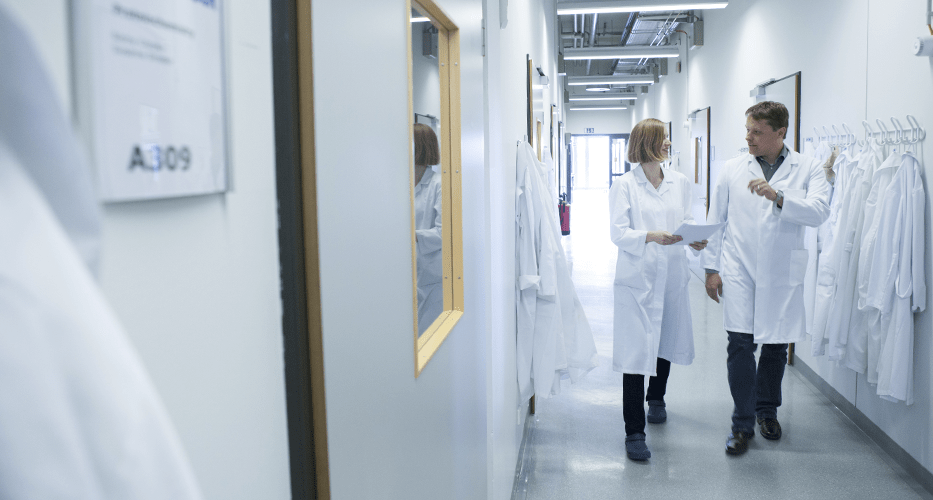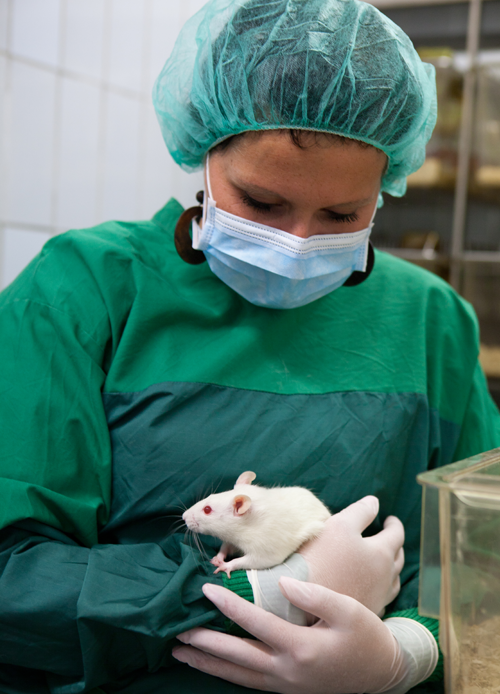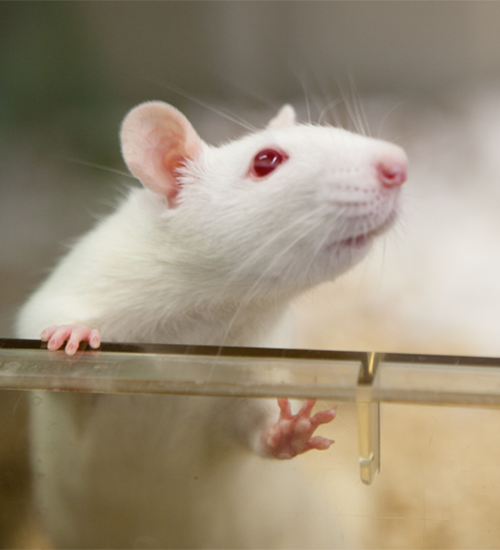Commitment to the Ethical Use of Animals in Research

Amgen is dedicated to creating innovative treatments for serious illnesses. To support the safety and effectiveness of new medicines, some tests may need to be performed on animals, consistent with local and international regulations. Amgen's policies require all animal research to go through rigorous ethical review, conducted with the highest care. This policy applies to all third-party organizations working with Amgen as well. Where possible, Amgen is committed to pursuing alternatives to animal research.
Alternatives to Animal Research
Amgen is fully committed to developing and using scientifically validated New Approach Methods (NAMs) as alternatives to animal use when acceptable to regulatory authorities and if they do not compromise patient safety. We engage internally and in cross-industry efforts to develop, refine and publish new in-vitro testing and predictive systems that hold promise in reducing use of animals.
As part of these activities, Amgen works directly with local and international regulatory authorities to increase the recognition and acceptance of alternative models, where appropriate.
Learn more about this work in this article Amgen contributed to in Nature Biomedical Engineering: Towards in vitro models for reducing or replacing the use of animals in drug testing.
Ethical Animal Use
As research progresses on the use of NAMs, evaluation of new medicines in animals remains an integral component of the drug discovery and development paradigm. Amgen's commitment to high ethical standards in the care and usage of all research animals strongly embraces the principles of Reduction, Refinement and Replacement (the “3 Rs”):

Reduce
Minimize animal numbers while maximizing data quality

Refine
Improve the lives of animals used in science and teaching

Replace
Promote the widespread adoption of non-animal models
Amgen is committed to applying the highest standards of animal care to support animal welfare. Some examples of our commitment include:
- Minimizing stress for rodents in our care by using alternative handling methods such as tunnels and cupping.
- Providing enrichment to encourage natural behaviors in the lab, including chew sticks, novel food items and nesting material.
- Providing socialization programs for appropriate species, including group housing, that encourage exercise and play.
- Donating to organizations that care for retired research animals and enable rehoming, where possible.
- Applying requirements as documented in the internal Global Laboratory Animal Care and Use Policy and training Research employees on these policies.

In addition to the 3Rs, Amgen's commitment for the responsible use of animals mandates the following:
- Oversight by Institutional Animal Care and Use Committees (IACUC) in the US and Animal Care Committees (ACC) in Canada, which review and monitor all animal research.
- Appointment of a responsible Amgen official to oversee animal research activities.
- Regular communication and reporting on animal welfare compliance.
- Accredited professional veterinary care.
- Mandatory training for employees working with animals.
- Accreditation of all Amgen animal facilities by the AAALAC International (formerly known as the Association for Assessment and Accreditation of Laboratory Animal Care) or the Canadian Council on Animal Care (CCAC).
- Ensuring that external partners follow the same animal welfare standards.

Amgen’s 3Rs Award Program
- Amgen has a long-standing 3Rs Award Program to recognize and reward our scientists who find new and better ways to advance these ethical principles.
- Amgen is a sponsor for the Innovation and Quality and AAALAC International Global 3Rs Awards Program, which recognizes researchers for their significant innovative contributions toward the 3Rs of animal research to advance ethical science.
- Amgen hosts subject matter experts to present at Amgen internal forums on NAMs and 3R methods

By adhering to these practices, Amgen strives to balance scientific advancement with ethical responsibility.

FAQs
Why is animal research necessary?
Amgen is committed to unlocking the potential of biology for patients suffering from serious illnesses by discovering and developing innovative human therapeutics. As part of that commitment, Amgen is ethically and legally obliged to rigorously evaluate the efficacy, safety and quality of potential new medicines. Given the present state of scientific knowledge, testing innovative new medicines in animals is frequently critical to their evaluation and is often required by regulatory authorities worldwide.
What kind of animals are used?
All vertebrate animals required for the discovery and development of new medicines are purpose-bred specifically for research by qualified, external business partners. Over 98% of animals used in Amgen research are rodent.
How is Amgen pursuing alternatives to animal research?
Amgen is actively working to develop New Approach Methods (NAMs) that may be used to reduce or replace animal studies that meet regulatory standards. We are engaged internally and across the industry in efforts to develop and refine new in-vitro testing and predictive systems that hold promise to reduce animal usage. We also collaborate with international authorities to promote these alternatives.
Amgen is an active member of the Biotechnology Innovation Organization (BIO), European Federation of Pharmaceutical Industries and Associations (EFPIA) and the International Consortium for Innovation and Quality in Pharmaceutical Development (IQ Consortium). As part of these activities, Amgen works directly with local and international regulatory authorities to increase the recognition and acceptance of alternative models, where such methods can be used appropriately.
Recent examples include:
- Amgen scientists are actively working with regulators and external business partners to replace an endotoxin test derived from the blood of a horseshoe crab with a non-animal derived, recombinant option.
- Amgen is working on building 3D tissue models from human tissues or cell lines to inform drug discovery and development.
- Amgen is identifying opportunities to replace or reduce animal use, for example in studies where immunogenicity presents challenges to maintaining drug exposure in the animal.
How does Amgen educate their employees and scientists on animal ethics and welfare?
All employees who work with animals must undergo mandatory and regular training designed to develop and refine their skills working with animals. Employees are trained to promote adoption of new and improved research methods and best practices, 3Rs (Replacement, Reduction and Refinement), understand ethical responsibilities and ensure Amgen's compliance with all relevant regulations and standards.
Who oversees animal research at Amgen?
Institutional Animal Care and Use Committees (IACUC) in the US, Animal Care Committees (ACC) in Canada and similar bodies worldwide oversee Amgen's animal research and compliance with local and international regulations for animal welfare. Comprised of scientists, non-scientists, veterinarians and community representatives, these committees review and approve all animal studies, monitor facility conditions and promptly address any welfare concerns. Amgen voluntarily appoints multiple community representatives on our internal committees to ensure a balanced review, surpassing regulatory requirements.
Under the oversight of an appointed Institutional Official or Senior Administrator, the IACUC and ACC operate independently, regularly communicating and providing status reports on animal welfare compliance.
Central to Amgen's animal care program is the Attending Veterinarian, or their delegate, who holds ultimate authority over animals under their care. This veterinarian ensures the well-being of research animals through compassionate daily care, health monitoring and timely intervention to prevent or alleviate discomfort or pain. Veterinary care is administered by accredited professionals with expertise in laboratory animal care and use, adhering to rigorous standards to uphold the welfare of animals involved in research.
What organizations does Amgen partner with to ensure animal welfare in research?
All Amgen-owned animal facilities are accredited by the AAALAC International (formerly known as the American Association for Accreditation of Laboratory Animal Care) or the Canadian Council on Animal Care (CCAC); both are voluntary and provide rigorous periodic review against the highest industry standards.
All external business partners (such as research animal vendors and contract research organizations) where we have externally placed animal studies follow the same standards mandated internally. We have a robust proactive monitoring process to ensure compliance.
What funding has Amgen provided towards the development of alternatives to animal research models?
Amgen is a sponsor for the Innovation and Quality and AAALAC International Global 3Rs Awards Program, which recognizes researchers for their significant innovative contributions toward the 3Rs (Replacement, Reduction and Refinement) of animal research to advance ethical science. Amgen has a long-standing 3Rs Award Program to recognize and reward our scientists who find new and better ways to advance these ethical principles.
Amgen also invests internally in the development of non-animal models. This includes investment in technologies such as high-throughput screening, organoids and computational modeling. Learn more about our work on 3D tissue models.
Amgen’s subsidiary, deCODE genetics, has significantly enriched Amgen’s pipeline through human genetic insights that drive the discovery and validation of drug targets, enhance precision medicine efforts and expand Amgen’s research and development capabilities. This human genetics capability helps build biological conviction in potential drug targets to optimize and refine (and in some cases replace) the use of animal models.
Additionally, Amgen provides funding and support for initiatives that seek to update regulatory frameworks to better accommodate and encourage the use of non-animal models. This includes working with regulatory agencies and contributing to scientific advisory panels as demonstrated in this Nature journal publication.
How is Amgen supporting the 3Rs and use of alternatives to animal research, where possible?
Amgen representatives participate in scientific advisory panels and working groups that advise regulatory bodies on the development and validation of alternative methods and 3Rs (Replacement, Reduction and Refinement) application. Amgen is an active member of the Biotechnology Innovation Organization (BIO), European Federation of Pharmaceutical Industries and Associations (EFPIA) and the International Consortium for Innovation and Quality in Pharmaceutical Development (IQ Consortium). Amgen also partners with the Health and Environmental Sciences Institute (HESI), which is a non-profit comprised of public and private partnerships that aims to address global health and safety issues, including novel approaches to the development and delivery of safe medicines.
